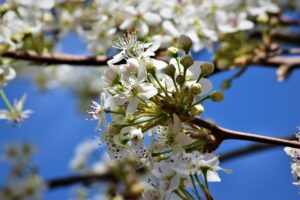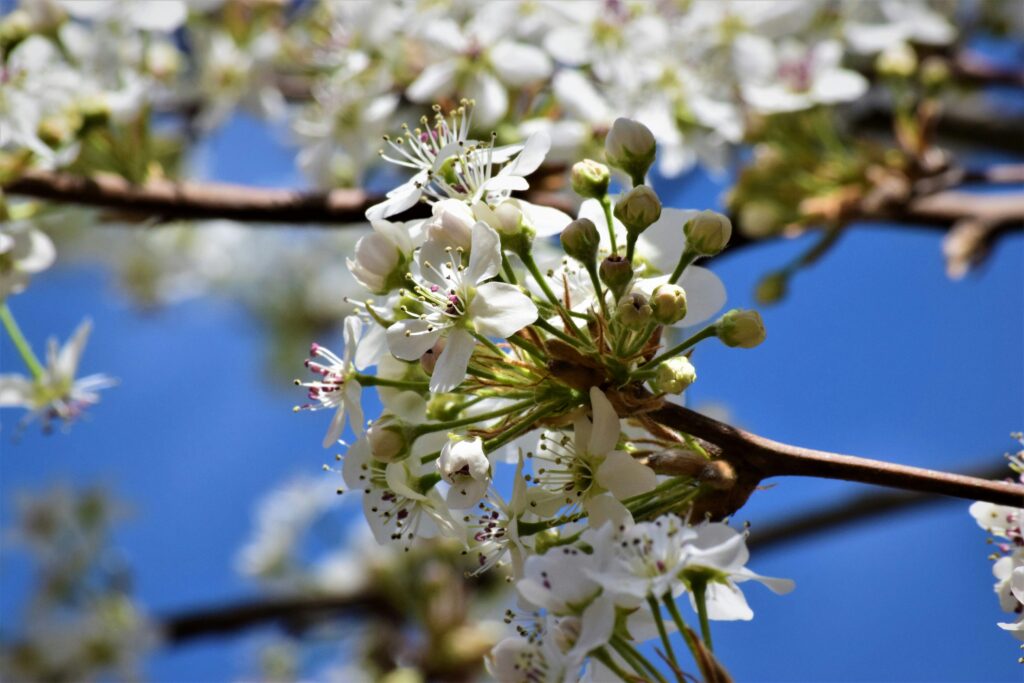I am the true grapevine and my Father is the gardener. John 15:1
A few weeks ago, as we were deep in contemplation about Jesus’ journey to the cross and awaiting the greatest miracle of all time, His resurrection, other smaller miracles were happening all around us. Spring was making its appearance, first in tiny, tentative steps, and then it seemed to virtually gallop onto the pages of our lives. There were crocus and daffodils, redbud and dogwood, wildflowers and perennials in countless varieties. So much beauty! One of the earliest flowering trees is the Bradford Pear or, as its common ancestor is known, the Callery Pear, Pyrus Callerana.
Not so many years ago, every new home plan included at least one Bradford Pear tree. They grew quickly, in no small part because of their long growing season, their lovely white spring blooms creating a visual balm for winter-weary eyes. They lasted longer into fall than many of our other trees as well, and delighted us with a myriad of autumn colors.
But there is a “however” to their description. Bradford Pears are not a native species, and just like other non-natives that have been introduced into our environment, they have become very invasive. They are a hybrid cultivar bred to be sterile but have proven to have an ability to overcome that barrier. Birds cross-pollinate them with neighboring trees, often causing a return to many of the attributes displayed by their ancestor, the Callery, one nasty quality being very spiny thorns. Once the trees establish themselves in the wild and multiply, those very thorns make them difficult to eradicate. They also spring up new shoots from their roots and can quickly overtake open fields. Thus, because the Bradford gets a head start in very early spring, many of our lovely natives are being crowded out.
 And let us not forget, as many of our neighbors have been learning lately, the structure of the Bradford is not conducive to providing strength. All its limbs spring forth from one central location and grow upward rather than alternately growing from a thicker main trunk and spreading outward. The central conjunction of all those branches invites moisture, eventually producing rotted wood. This unique pattern makes the species weak and easily broken when covered in ice and snow or battered by strong winds. Many a home has been invaded by a Bradford branch during one of our powerful and unpredictable weather systems. It’s not unusual to see half a tree where there once stood a lovely Bradford.
And let us not forget, as many of our neighbors have been learning lately, the structure of the Bradford is not conducive to providing strength. All its limbs spring forth from one central location and grow upward rather than alternately growing from a thicker main trunk and spreading outward. The central conjunction of all those branches invites moisture, eventually producing rotted wood. This unique pattern makes the species weak and easily broken when covered in ice and snow or battered by strong winds. Many a home has been invaded by a Bradford branch during one of our powerful and unpredictable weather systems. It’s not unusual to see half a tree where there once stood a lovely Bradford.
The once popular Bradford Pear has been banned in the states of Ohio, Pennsylvania, and South Carolina. Missouri is making its bid to eradicate this “beautiful pest” from our lawns and fields. They offer a buy-back program that provides a start of a native tree to residents who can verify that they have removed a Bradford from their property.
At some point during my Lenten readings, I was happy to see one of my favorite scriptures as the reference for that particular devotion. The early verses of John 15, in Jesus’ own words, carry such a reassuring promise when He refers to himself as the vine and us as the branches. As long as we remain attached to the vine, we will be sheltered and protected. We will produce much fruit. But, tucked within Jesus’ encouraging words is a warning, and the author of this devotion chose the warning to illustrate a point. If we choose to detach ourselves from the vine, we become useless and will be cast aside to be burned. I began to see this well-loved scripture in a new light.

Anyone who does not remain in me is thrown away like a useless branch and withers. Such branches are gathered into a pile to be burned. John 15:6
It is difficult to relate the beauty of the earlier verses to the overarching threat of the second part. But the truth is we can be seduced by the world to break away from the vine. But….
Remain in me and I will remain in you. For a branch cannot produce (good) fruit if it is severed from the vine, and you cannot be fruitful unless you remain in me. John 15:4
The Bradford Pear tree certainly provides beauty, but its invasive nature and ability to adapt to changing conditions pose a serious threat to our environment, and so it must be removed. Similarly, the life that we have in Jesus can be contaminated by outside forces that want to lure us away. We must be on our guard and hold tightly to the vine, not let invasive habits entangle our thinking and worm their way into the patterns of our lives. A strong and constant relationship with Jesus nestles us within the protective arms of the Father and ensures a place for us in eternity. The world may try to eradicate Christianity, but healthy branches attached to a strong vine can overcome anything the world has to offer. I like the idea of Jesus being the gardener of my life…don’t you?



The Holy Spirit shines through you as you write these posts. This one in particular touched my heart. Thank you for sharing your gift.